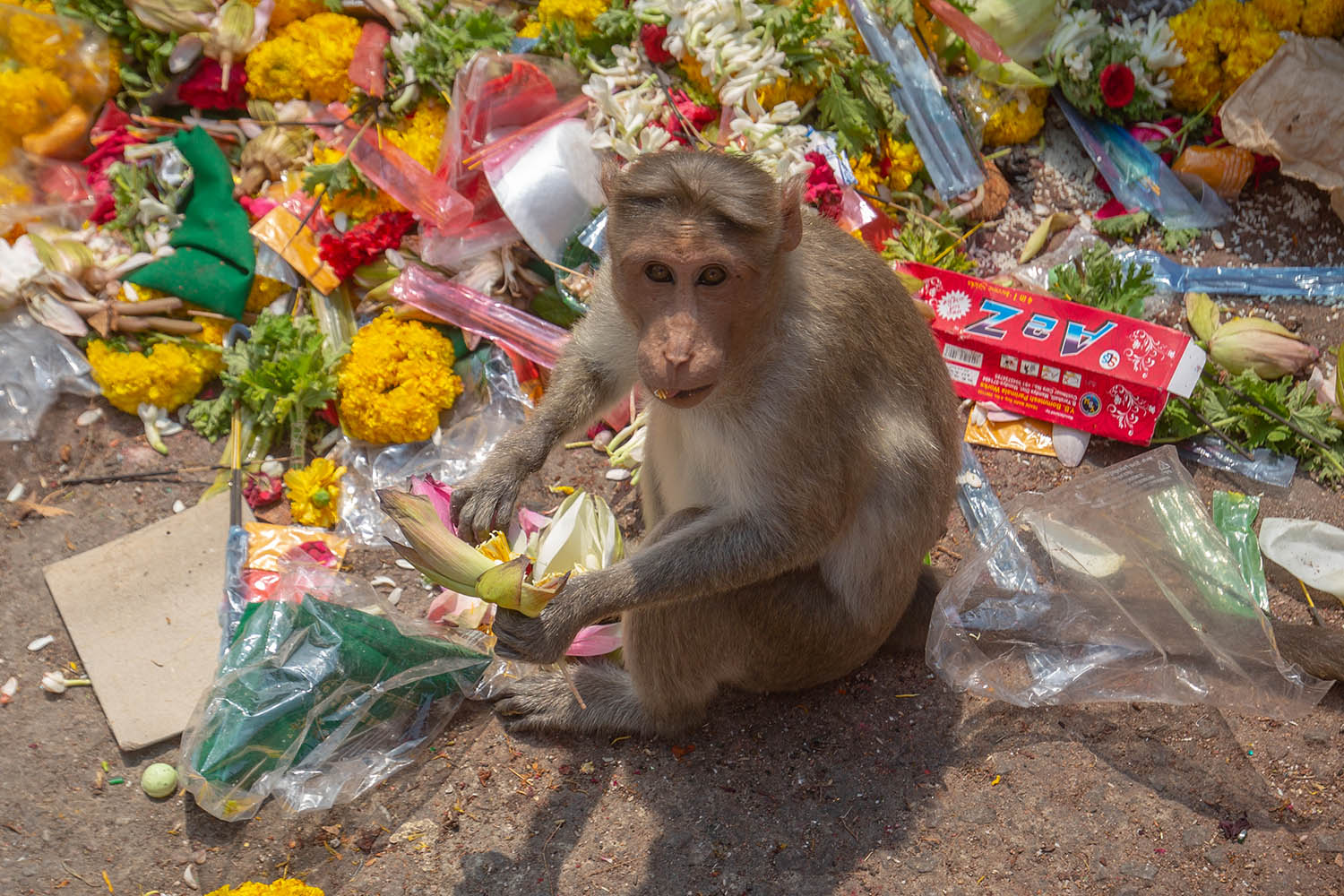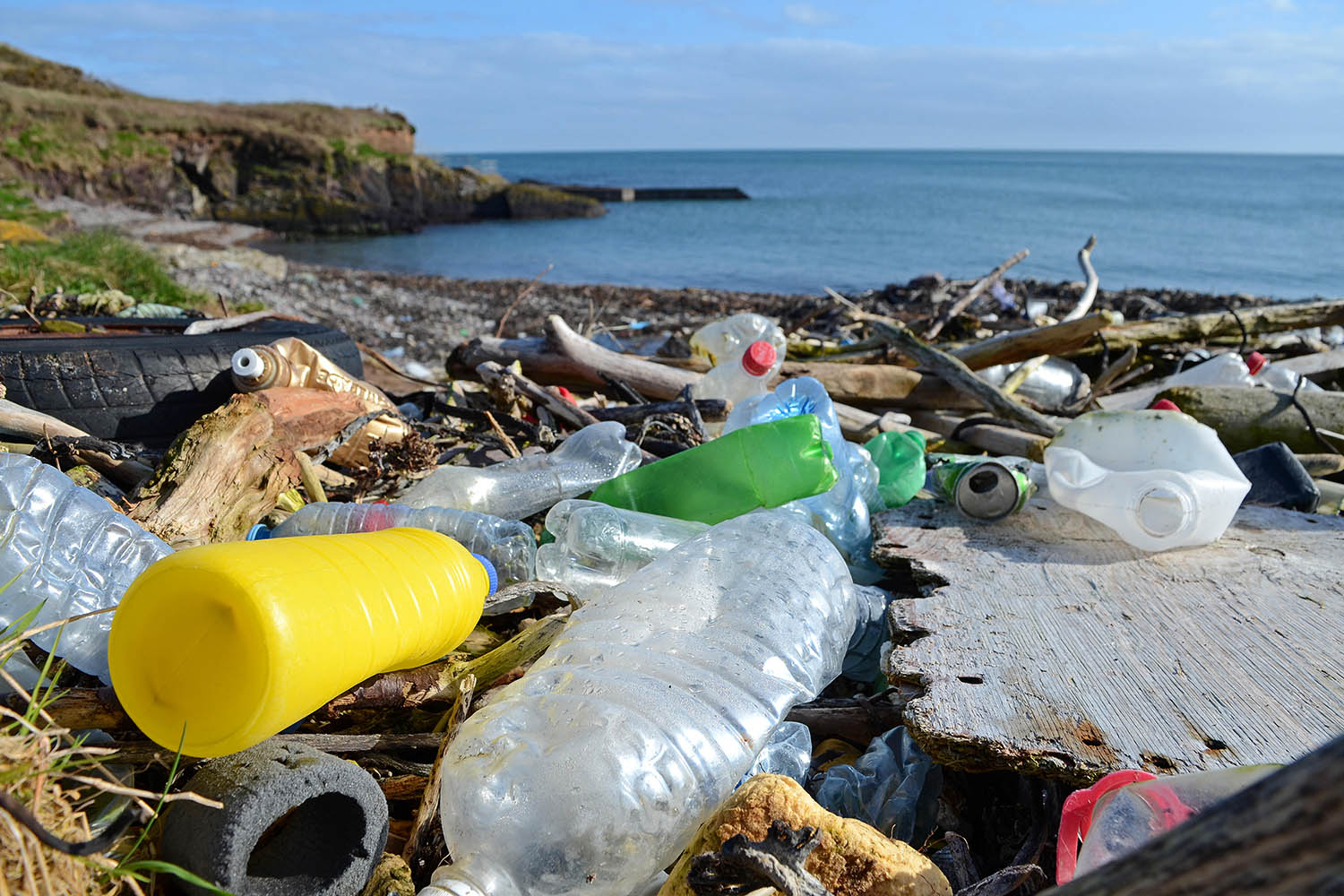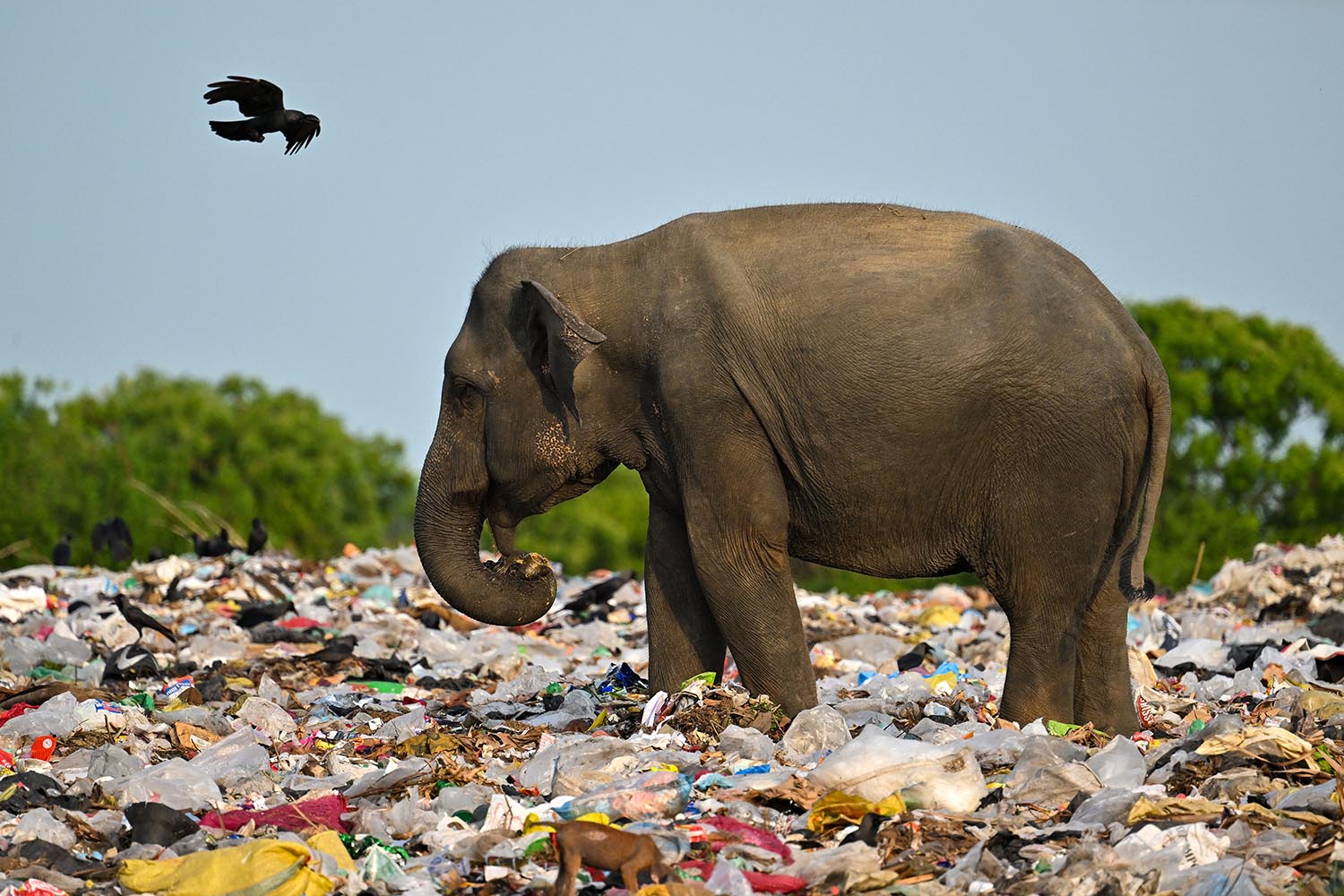The elephant calf tried to wake its mother when she collapsed, near a rubbish dump in Coimbatore in southern India. Vets tried to help, first winching her back to her feet, then taking her to a hydrotherapy pool to recover, but she died a few days later.
An autopsy revealed her intestines were full of plastic bags and packets, eaten while she was grazing for food.
“Elephants are often attracted to garbage dumps that are at the edge of forests to access easy food,” said Aritra Kshettry, who leads wildlife charity WWF India’s elephant conservation programme. “Plastics in elephant dung has been reported from all the four elephant populations in India and seems to be a widespread issue.”
Macaques, porcupines and sambar deer have also been found with plastic in their guts.
Plastic was conceived as a way of saving elephants from extinction. Ivory was in such demand in the 1860s that a billiard ball-maker offered a reward for an alternative. The challenge was met by John Wesley Hyatt, who created celluloid.
The array of plastic invented since, from cling film to Lycra to Lego, now presents a threat to elephants, not to mention the rest of the planet. A 2022 study found plastic or other human products in a third of all elephant dung, Kshettry said.

India is perhaps the world’s largest plastic polluter. Last year researchers from Leeds University found it was responsible for nearly 20% of the world’s plastic waste. India’s government is trying to clean up the mess, with bans on the sale of 19 types of single-use plastic.
Yet when it comes to taking action globally, India is less keen. This month, the world has been meeting in Geneva to discuss a global plastics treaty, and there are two sides. India has supported the “like-minded countries” (LMC) group, many of them oil producers such as Russia, Saudi Arabia and Iran, which believe the solution lies in managing plastic waste – recycle it, burn it or bury it.
That will not work, according to the High Ambition Coalition (HAC), with more than 100 countries including the UK, which say the only way to curb waste is to limit the amount of plastic we make, ban some types of product such as plastic forks or straws, and draw up a list of toxic chemical additives to phase them out.
‘There is no such thing as sustainable plastic consumption if it is still produced at a devastating rate’
Ruby Free, campaigner
The concourses of the UN’s Palais des Nations were dominated by two conversations last week.
The first was a report by the Lancet that laid out the health consequences of plastic. People who work or live near plastic factories are more likely to have stillbirths, asthma and leukaemia. Microplastic particles – mostly from paint, clothes and car tyres – are now found in our blood, livers, kidneys and lungs. Babies are exposed to them in the placenta and through breastmilk. Microplastics can penetrate the blood-brain barrier, and there is evidence that high levels are associated with dementia.
The second conversation was about the US. Which way would Donald Trump jump? He pulled out of the Paris agreement on climate, and did not send anyone to the UN Ocean Conference in June, so simply having a US delegate was encouraging. But on Friday it emerged the US had been privately lobbying against curbs to plastic production.
“Everybody [has] made the point that, on the one hand, this is an agreement about plastic pollution. On the other, it’s a test of the multilateral system,” said Prof Steve Fletcher, director of the University of Portsmouth’s Revolution Plastics Institute. If the negotiations collapse, what might that mean for the multilateral system?
The US says it is attempting to protect private companies, which are well-represented by lobbyists in Geneva – a record number of 234, many from oil and chemicals giants that Greenpeace has accused of “systematically lobbying against cuts to plastic pollution”. Some firms have reduced their pledges on reusing or recycling products, such as Coca-Cola, which has lowered its target for including recycled content in its packaging by 2030.
Ruby Free, policy officer at Surfers Against Sewage, said some companies were trying to block a plastic-free future. “No matter how ambitious, waste management and better recycling will not solve the crisis. There is no such thing as sustainable plastic consumption if it’s still being produced at the same devastating rate.”

Plastic waste washed up on the beach at Trabolgan in southern Ireland
Yet other firms say they need a treaty to create a level playing field. Unilever, which has been criticised for continuing to make plastic sachets, says the proposed measures to restrict plastic production are essential to “achieve sustainable levels of plastic production and consumption”.
What do we do with all the plastic waste already in existence? The Lancet estimated that there were 8bn tonnes in the world, yet less than 10% is recycled. Each year, the UK creates 2 mega-tonnes of plastic packaging (1 mega-tonne is 1m tonnes), 1.9mt of consumer products, 1mt in vehicles, 0.8mt in construction and 0.2mt in textiles. Only 0.4mt a year is recycled – most plastic is sent to incinerators and the rest is exported or dumped in landfill.
Radically reducing plastic means reusing containers and the UK will introduce a deposit-return scheme for drinks bottles in October 2027, hoping it will prove as successful as Latvia’s, which now sees 80% of plastic and glass bottles and aluminium cans returned, two years after the scheme began.
The microplastics already in the ocean will probably stay there, according to Prof Richard Lampitt of the National Oceanography Centre.
“People have talked about enzyme systems to break down plastic, but there is, in my view, no feasible way to remove this from the ocean,” he said. “But this material doesn’t last forever and it will eventually break down.” That still means stopping more plastic entering the ecosystem, he added.
On Thursday we will discover whether the world can agree to that.
Photographs by Ishara S Kodikara/AFP and Abhishek Chinnappa/Getty

